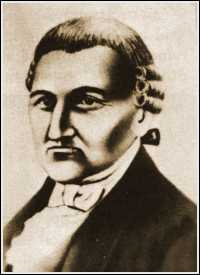A Biography of David Brearly 1745-1790
 Brearly (Brearley) was descended from a Yorkshire, England, family, one of whose members
migrated to New Jersey around 1680. Signer Brearly was born in 1745 at Spring Grove near
Trenton, was reared in the area, and attended but did not graduate from the nearby College of
New Jersey (later Princeton). He chose law as a career and originally practiced at Allentown, NJ.
About 1767 he married Elizabeth Mullen.
Brearly (Brearley) was descended from a Yorkshire, England, family, one of whose members
migrated to New Jersey around 1680. Signer Brearly was born in 1745 at Spring Grove near
Trenton, was reared in the area, and attended but did not graduate from the nearby College of
New Jersey (later Princeton). He chose law as a career and originally practiced at Allentown, NJ.
About 1767 he married Elizabeth Mullen.
Brearly avidly backed the Revolutionary cause. The British arrested him for high treason, but a group of patriots freed him. In 1776 he took part in the convention that drew up the state constitution. During the War for Independence, he rose from a captain to a colonel in the militia.
In 1779 Brearly was elected as chief justice of the New Jersey supreme court, a position he held until 1789. He presided over the precedent-setting case of Holmes v. Walton. His decision, rendered in 1780, represented an early expression of the principle of judicial review. The next year, the College of New Jersey bestowed an honorary M.A. degree on him.
Brearly was 42 years of age when he participated in the Constitutional Convention. Although he did not rank among the leaders, he attended the sessions regularly. A follower of Paterson, who introduced the New Jersey Plan, Brearly opposed proportional representation of the states and favored one vote for each of them in Congress. He also chaired the Committee on Postponed Matters.
Brearly's subsequent career was short, for he had only 3 years to live. He presided at the New Jersey convention that ratified the Constitution in 1788, and served as a presidential elector in 1789. That same year, President Washington appointed him as a federal district judge, and he served in that capacity until his death.
When free from his judicial duties, Brearly devoted much energy to lodge and church affairs. He was one of the leading members of the Masonic Order in New Jersey, as well as state vice president of the Society of the Cincinnati, an organization of former officers of the Revolutionary War. In addition, he served as a delegate to the Episcopal General Conference (1786) and helped write the church's prayer book. In 1783, following the death of his first wife, he had married Elizabeth Higbee.
Brearly died in Trenton at the age of 45 in 1790. He was buried there at St. Michael's Episcopal Church.
